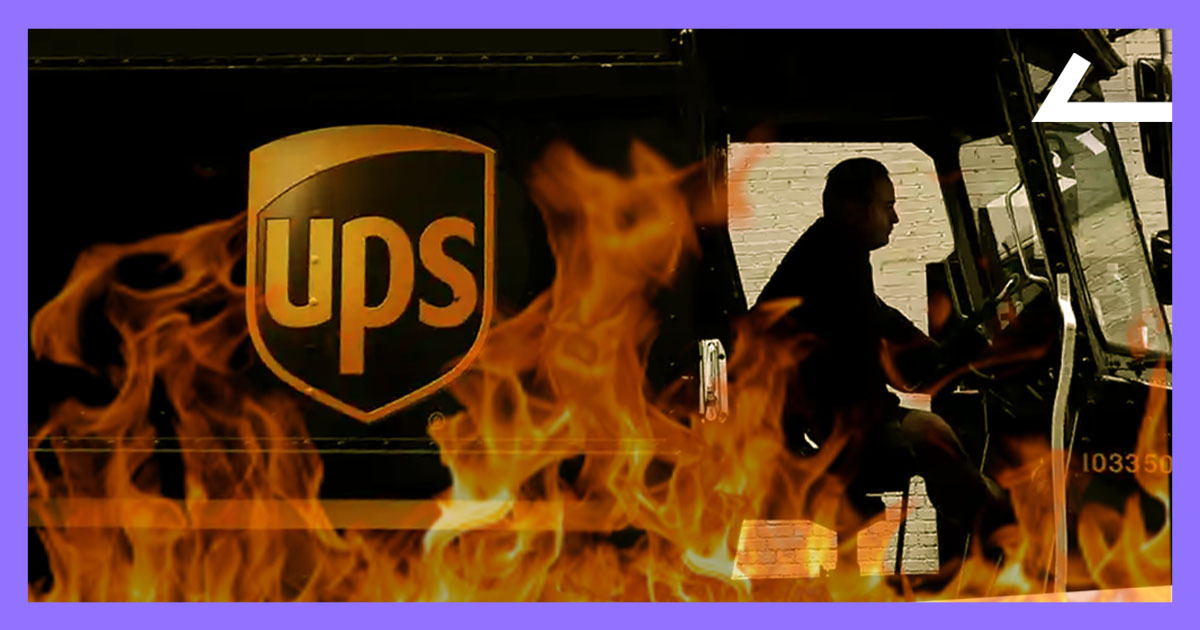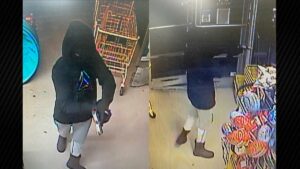Produced and edited by Libby Rainey and Josh Hirschfeld-Kroen
UPS drivers are collapsing in the street, suffering heat stroke & dying because the company refuses to put air conditioning in their trucks. UPS made $13 billion in profit last year yet won’t pay for A/C like FedEx & Amazon already do. We spoke with workers fighting back against UPS. Below is a full transcript of the video.
[News anchor]: We’re learning more about that alarming video of a UPS guy in distress from the extreme heat…
[News anchor]: UPS drivers call these the box, and there’s a reason. Outside we’re registering 95 degrees. But inside, we’re at 120.”
Hector Medina: UPS driver died in California, UPS driver died in Texas, this is us too. People see the package car; he’s probably just in their sorting. Well, guess what, he could be passed out back there.
[Narrator]: In the midst of record heat waves, UPS drivers are on the front lines, working 10, 12, even 14 hour days, with no relief. But there’s a simple solution, a technology that’s been around for almost a century, that would save lives.
Texas UPS Driver: Any normal citizen, walking into your car on a hot summer day, the first thing you do is turn your A/C on.
[Narrator]: But UPS refuses to pay for it. Even as they’re raking in record profits. Even though it would cost them next to nothing.
Hector: FedEx and Amazon put air conditioning in their delivery vehicles, and UPS, the number one shipper in the world, does not. And we are dying without it.
[Narrator]: So we talked to UPS drivers in Florida, Texas, and New York, about what it feels like to spend your days trapped in “the box”. And how they’re fighting for access to A/C.
Texas UPS Driver: People having heat strokes, dying in the desert, I never really understood that when watching movies, but working in the conditions that we work in on a daily basis… it’s pretty astonishing how quickly your body can collapse and shut down.
I’ve had a digital thermometer in my cargo area, and I’ve seen it reach north of 145 degrees Fahrenheit.
Hector: There’s no ventilation in that cargo area. You’re opening, like the tomb…the heat in there is stale. The faucet of sweat is literally dripping down your face. The shelves are made out of steel. So if I’m grabbing a package off the shelf, I’m gonna get burned here, I’m gonna get burned here. I mean, HOT. So hot that we joke that you could scramble eggs on the shelf.
[Narrator]: Even on the hottest summer days, UPS forces drivers to work long hours, at a dangerous pace.
Hector: UPS is very performance-based. Let’s go, let’s go, let’s go.
Vinnie Perrone: This is what I took from that video. They indoctrinate you so much that this kid got up after fainting from the heat, and rang the customers bell. Cuz that’s what they want!
Hector: There’s a direct correlation between performance, how fast you do the job, and us passing out from heat stroke.
Texas UPS Driver: In 2018, I was on the verge of a heat stroke. By the time I got to the ER, I couldn’t speak to my wife, form a normal sentence, and was in and out of consciousness for about 4 to 5 hours.
[Narrator]: Talk to enough UPS drivers, and you’ll find that these stories are extremely common.
Hector: In my 25 years at UPS, I have known countless drivers who have been hospitalized for dehydration.
Texas UPS Driver: In the last month alone, I know of about 5 drivers who have gone to the ER for heat exhaustion.
[Narrator]: Between 2015 and 2019, at least 107 UPS workers were hospitalized for heat-related illnesses. But those are just the incidents that are reported.
Texas UPS Driver: Several coworkers of mine that are new drivers, call in, heat exhaustion, and it’s swept under the rug; they’ll sit em down in the office, not administer medical attention so the company doesn’t get hit with an injury; the next day, 2, 3 days, you see that same driver cramping up in his vehicle, throwing up on the side of the road, and ultimately ending up in the ER.
[Narrator]: And the drivers who get to that stage…they’re instructed to call management before calling 9-11.
Texas UPS Driver: That’s a standard operating procedure…for UPS drivers. I know it significantly delayed my medical care.
Theresa Klenk: They’re told not to call 9-11. They’re told not to report it to OSHA. So you have a lot of unreported cases. Because UPS doesn’t want those reported stories.
[Narrator]: That’s Theresa Klenk, a registered nurse whose husband nearly died while working for UPS in 2016.
Theresa: When my husband almost died, and I saw the tears in his eyes, I said enough is enough and I started the petition.
[Narrator]: That petition called on UPS to provide air conditioning to all of their drivers. It now has over a million signatures. But UPS hasn’t listened. Instead, the company points to its “cool solutions” program – designed to offer drivers tips and tricks for managing extreme heat.
Hector: These trainings are probably a minute long. We’re doing this in the heat, remember. There’s no A/C, ever, available to us. So we just hit enter, enter, enter. We don’t care if we get the questions right. We gotta keep moving.
[Narrator]: UPS encourages drivers to take measures like finding shade, eating watermelon, and drinking water. But that assumes they have access to water.
Texas UPS Driver: Here in Texas, at least in our area, we have not been provided water for at least 2 to 3 years.
Hector: They give us water. But that just happened recently. They’ve been giving us water for the last 5-7 years. So we always wonder: who died? And I know that sounds cold, but that’s the reality. People are dying.
[News anchor]: Esteban Chavez had just turned 24, the day before he collapsed on the job.
Hector: A driver died, in California, that was Esteban, and UPS didn’t even mention it the next morning. Because what happens when you mention it? You have to accept some sort of responsibility.
[Esteban Chavez Sr. on the news]: It’s a pain that’s never going to go away. This could bring awareness to his line of work, to the other drivers that are out there.
[Antoine Andrews at a rally]: We are the voices of Chavez. We are the voices of all those who have lost their lives while in the back of the vehicle. And we tell United Parcel Service that enough is enough. We are sick and tired of them putting profit over people.
[Narrator]: Instead of protecting drivers, UPS enriched wealthy shareholders through $5 billion in stock buybacks.
Hector: UPS made 24 billion in revenue, last quarter. They can easily afford to put A/C in those package cars.
[Narrator]: UPS saves only $185 dollars up front by removing A/C from vehicles. The company claims that adding air conditioning to vehicles would be impractical, given the frequent number of stops drivers are forced to make.
Vinnie: It’s not that it’s not practical. It’s that they dont wanna spend the money. That’s less money that goes into their shareholders pockets.
Hector: All of our competitors offer air conditioning to employees who do deliveries.This is not some groundbreaking innovation. My response to Carol Tomé, the CEO of UPS, is, come out with us. Feel it for yourself and then maybe there would be some compassion there.
[Narrator]: UPS has yet to show such signs of compassion. But within the next year, they may be forced to change their mind. On August 1st, 2023, the current contract for the Teamsters at UPS is set to expire. So Teamsters are gearing up for a standoff with the company, and their demands for air conditioning are likely to be at the center.
[News anchor]: The teamsters union is staging a series of protests across the country for UPS drivers.
Hector: With the upcoming contract negotiations, air conditioning is gonna be a huge topic. I think we’re fortunate in that we have new union leadership.
[Sean O’Brien at a rally]: We are 365 days away from a potential strike. There’s two choices. Either we get the best contract, or we put this company on the street and set the example for the entire labor movement.
Vinnie: 2023 is coming, and we need to start changing how they think immediately.
Theresa: My message to the company? Stop putting profits over your employees’ lives.
Hector: If I had air conditioning, it would be a totally different job. I hope you guys interview me a year from now, and I’m smiling; you see me out there, and I’ve got that air conditioning blowing.
Videography by Camila Ortega



